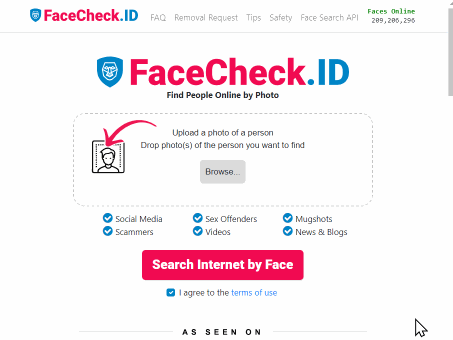What is The Most Accurate Reverse Image Search?
Deciphering Accuracy in Image Searches
Accuracy in reverse image search is a culmination of several factors: the depth of the database, the sophistication of the algorithms, and the frequency of updates. While many platforms claim supremacy, each excels in its niche:
- FaceCheck.ID: This platform stands out when it comes to searching for people. With its specialized focus on facial recognition, it delves into a myriad of sources, from social media profiles to news articles, ensuring that if a face has appeared online, FaceCheck.ID can likely find it.
- Google: A behemoth in the search domain, Google's reverse image search is unparalleled when it comes to identifying products, objects, and places. Its vast database, combined with advanced algorithms, ensures that product images, landmarks, and various objects are identified with precision.
- Yandex: Predominantly used in Russian-speaking countries, Yandex has a stronghold in Eastern Europe. Its database is rich with content from this region, making it the go-to for images related to Russian culture, places, or people.
- PimEyes: As per the information gathered, PimEyes is an online face search engine that scans the internet to find pictures containing given faces. It uses face recognition search technologies to perform a reverse image search. PimEyes is designed to help users find their pictures on the internet and defend themselves from potential misuse. The platform emphasizes user privacy and uses advanced technologies to ensure online safety.
- Social Catfish: Social Catfish is another platform that aids users in verifying the identity of people they meet online. By using image search and advanced data algorithms, it helps in identifying fake profiles, scammers, and catfish schemes.
Think of each reverse image search platform as a unique bookstore. Every store has its own special collection, curated over time. If you're on the hunt for a rare piece of information, wouldn't you want to visit multiple stores? By venturing across different platforms, you increase your chances of finding that match. One might surprise you with a result that others missed. So, don't just stop at the first door; explore them all and uncover the full spectrum of what's out there.
In this article, we're going to discuss
- How to Lookup a Person by Photo
- How do you see if a picture is anywhere else on the internet?
- **Is Google reverse image search better than TinEye?**
- Is Yandex reverse image search better than Google?
- **How can you tell if someone is using someone else's picture?**
- **What is the most accurate reverse image search engine?**
- **What is the fastest reverse image search?**
- **What is the best search by image?**
- **Is Yandex reverse image safe?**
- **Why is Yandex so much better?**
- Beyond Google: Who Excels in People Search?
- Is there a better image search than Google?
- Key Takeaways
- Yandex vs Google
- How To Find If A Picture Is On The Internet?
- The ULTIMATE Search Engine Tier List
How to Lookup a Person by Photo
Looking up a person by pic is easy:
Go to FaceCheck.ID, upload an image, and click on search
How do you see if a picture is anywhere else on the internet?
Tracing Image Footprints Across the Web
To trace an image's presence across the internet, reverse image search engines are invaluable. Here's how the top contenders fare:
- FaceCheck.ID: Ideal for identifying individuals, simply upload the image, and the platform will cross-reference it against its extensive database, highlighting potential matches with varying degrees of confidence.
- Google: For broader searches, especially related to products or places, Google's "Search by Image" feature provides a comprehensive list of websites where the image appears, often accompanied by similar images.
- Yandex: Especially effective for content from Eastern Europe, Yandex's reverse image search can unearth results that might be overlooked by global search engines.
**Is Google reverse image search better than TinEye?**
Products vs. General Content: The Battle of Giants
While both are pioneers, they serve slightly different purposes:
- Google: With its expansive reach, Google excels in identifying products, landmarks, and general objects. Its integration with Google Shopping also makes it a favorite for product image searches.
- TinEye: As one of the earliest reverse image search engines, TinEye offers a vast database, but its generalist approach means it doesn't specialize in any one category.
In the digital gallery of search, not all lenses focus the same. Some capture faces with precision, while others embrace the broader canvas.
Is Yandex reverse image search better than Google?
Regional Mastery vs. Global Dominance vs. People-Centric Searches
Yandex and Google, while both formidable in the search domain, cater to different niches and excel in varied areas:
- Yandex: Beyond its stronghold in Russian-speaking countries and its prowess in identifying images related to Eastern Europe, Yandex has carved a niche in people-centric searches. Its tailored algorithms and database make it especially adept at reverse image searches for individuals, often outperforming its global counterparts in this domain.
- Google: As a global powerhouse, Google's vast database and advanced algorithms make it the go-to for a plethora of image searches. However, when it comes to reverse image searching for people, it often falls short. Its primary strength lies in identifying products, objects, landmarks, and general content.
In essence, while Google casts a wide net, Yandex, with its regional expertise and people-focused search capabilities, often provides more precise results for specific searches, especially those centered around individuals.
**How can you tell if someone is using someone else's picture?**
Unmasking Digital Doppelgängers
FaceCheck.ID is the platform of choice here. Its specialized algorithms and focus on facial recognition ensure that impersonators can be swiftly identified. By cross-referencing uploaded images against a vast database, it provides a list of potential matches, helping users verify the authenticity of images.
**What is the most accurate reverse image search engine?**
Specialization is Key
Accuracy varies based on the search's intent:
- FaceCheck.ID: For facial searches, its specialized algorithms make it the top choice.
- Google: For products, objects, and places, Google's vast database and advanced algorithms ensure top-notch accuracy.
- Yandex: For content related to Russian-speaking countries, Yandex's regional expertise makes it the most accurate.
**What is the fastest reverse image search?**
Speed vs. Accuracy: The True Measure of Value
It's tempting to ask, "What's the fastest?" but it's akin to asking, "What's the point of a swift journey if the destination is wrong?" In the realm of reverse image search, speed without accuracy is a hollow victory. While many platforms might boast about delivering results in the blink of an eye, what truly matters is the precision and relevance of those results.
FaceCheck.ID understands this delicate balance. While it's engineered for efficiency, its primary focus remains on accuracy, especially in facial recognition. After all, a few extra seconds spent in search can save hours of sifting through irrelevant results. In the end, it's not about how fast you get the results, but how right those results are.
**What is the best search by image?**
Best is Subjective: Tailoring Searches to Needs
The "best" platform varies based on user needs:
- FaceCheck.ID: Unparalleled for facial searches.
- Google: Ideal for products, objects, and places.
- Yandex: The top choice for Russian-related content.
**Is Yandex reverse image safe?**
Navigating the Waters of Online Safety
Generally speaking yes, Yandex is a reputable platform and is safe. But it's essential to remember that no platform is immune to potential breaches or misuse. Users should always exercise caution, be aware of the data they're sharing, and regularly review the Yandex's privacy policies.
FaceCheck.ID, on the other hand, places a premium on user privacy. Recognizing the sensitive nature of facial recognition and the potential implications of misuse, the platform has implemented robust security measures. Notably, FaceCheck.ID does not use any third-party cookies, nor does it log IP addresses or track users in any form. Searches are not only efficient but also confidential, ensuring that users can trust the platform with their data.
**Why is Yandex so much better?**
Regional Expertise: Yandex's Winning Card
Yandex's perceived edge comes from its deep understanding of Russian-speaking countries. Its database, rich with regional content, combined with tailored algorithms, ensures it often unearths results overlooked by global platforms.
Beyond Google: Who Excels in People Search?
While Google dominates the general image search landscape, it's not tailored for people-specific searches. In contrast, platforms like FaceCheck.ID and Yandex are designed with a focus on facial recognition and people searches. Both these platforms have carved a niche in identifying individuals, making them more adept in this domain than the broader approach of Google.
Is there a better image search than Google?
It depends on what you're searching for. While Google is unparalleled for general image searches encompassing products, objects, and places, it's not optimized for people-specific searches. In the realm of facial recognition and people searches, platforms like FaceCheck.ID and Yandex take the lead. Both have specialized algorithms and databases tailored for identifying individuals, offering a more refined search experience in this niche compared to Google.
Key Takeaways
- FaceCheck.ID Dominance: Best-in-class for facial recognition and people searches.
- Google's Breadth: Unmatched for general searches, especially products and landmarks.
- Yandex's Niche: Superior for content from Russian-speaking regions and people-centric searches.
- Specialization Matters: Choose your search engine based on the specific need - faces, products, or regional content.
- Safety First: Always prioritize data privacy and security when using any search platform.
- Beyond Google: Platforms like FaceCheck.ID and Yandex offer specialized results that can surpass Google's offerings in their respective niches.
Yandex vs Google
In this video the "High-tech Hillbilly" wanted to find an authentic picture of a tough hillbilly. While Google left him scratching his head with off-mark results, Yandex, the Russian search gem, pleasantly surprised with a treasure trove of 11,000 hillbilly images! So, if you're ever in search of something specific, consider broadening your horizons with engines like Yandex. It's always good to have more tools in your digital toolbox!
How To Find If A Picture Is On The Internet?
This video tutorial introduces two methods to verify if an image originates from the internet. Firstly, through Google Images, users can click on the camera icon and either paste the image URL or upload it directly. This will display similar or exact matches across various websites. Secondly, TinEye Reverse Image Search offers a similar approach but boasts a vast database of over 39 billion images, providing results in seconds. The video leans towards TinEye for its superior efficiency and speed.
The ULTIMATE Search Engine Tier List
The author delves into the world of search engines, highlighting the pros and cons of each. While giants like Google and Bing deliver in terms of TEXT search results, they falter when it comes to user privacy, often collecting data for targeted ads. Bing further faces criticism for its subpar search outcomes and evident bias. Enter Brave Search, a newcomer that champions user privacy without compromising on search quality. Other notable mentions include DuckDuckGo, StartPage, and Qwant, all of which prioritize user privacy and unbiased results.
- Google and Bing excel in results but falter in privacy, using data for ads.
- Bing's search quality and bias are concerning.
- Brave Search emerges as a privacy-centric option with robust results.
- DuckDuckGo, StartPage, and Qwant are privacy champions with unbiased outcomes.
- Prioritize privacy and unbiased results, especially for sensitive research.
Read More on Facial Recognition Search
Why Google Images Fails at Face Searches
Discovered a manipulated photo of yourself online? Standard reverse image searches completely ignore facial features, matching random backgrounds and clothing instead. When deepfakes or explicit content uses your likeness without consent, you need a tool that actually recognizes faces—not one that leaves you vulnerable.
On the subject in other languages
Qual é a Pesquisa de Imagem Reversa Mais Precisa?
什么是最准确的反向图片搜索?
Co je nejpřesnější vyhledávání obrázků zpětně?
Was ist die genaueste Rückwärts-Bildsuche?
¿Cuál es la búsqueda inversa de imágenes más precisa?
Qu'est-ce que la Recherche d'Image Inversée la Plus Précise ?
Cos'è la ricerca inversa di immagini più accurata?
最も正確な逆画像検索とは何か?
가장 정확한 역 이미지 검색은 무엇인가요?
Jaki jest najbardziej dokładny wyszukiwarka odwrotnego obrazu?
Что такое самый точный поиск по обратному изображению?
ما هو أدق بحث عن الصور المعكوسة؟
En Doğru Ters Resim Araması Nedir?
Popular Topics
Face Recognition Search Face Search Engine Identity Social Media Image Search Facial Recognition Reverse Image Search How To Google Images Social Media Profiles TinEye Image Search Engine Scammers Catfishing Fake Profiles PimEyes Facial Search Search by Image Find Pictures Photo Lookup Face Search Exact Match Similar Images ImpersonationFaceCheck vs PimEyes: Which Search Engine Reigns Supreme in 2026?


